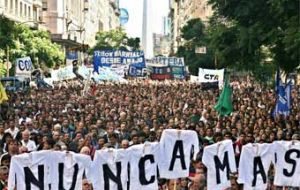MercoPress. South Atlantic News Agency
Protesting teachers bring Argentina to a near standstill
 Teachers protest in Bs. Aires
Teachers protest in Bs. Aires Argentina was brought to a near standstill on Monday amid protests over the killing of a teacher in the Patagonian province of Neuquen during a protest clash last week.
Tens of thousands took to the streets of Buenos Aires and other cities nationwide to protest police brutality and demand the resignation of Neuquen Governor Jorge Sobisch considered politically responsible for the killing. Schools remained closed, public transport halted and banks and many offices shut for a couple of hours. Chemistry teacher Carlos Fuentealba was killed during a protest over pay after being hit by a tear gas canister fired by police at close range in Neuquen. Striking teachers in Buenos Aires convened at the Obelisk in downtown and were joined by sympathetic labour groups and human rights activists, and began a traffic-snarling march at midday through the capital, beating drums and waving protest banners. In Neuquen an estimated 25.000 joined the protesting teachers who painted the façade and doors of Government House black and blocked the main routes leading to the capital of the Patagonian province rich in natural gas resources. Governor Sobisch withdrew all police forces from the city. Other massive teachers' protests also took place in Salta, La Rioja and even Santa Cruz, which is President Nestor Kirchner's stronghold and, according to the Argentine press, fearing pickets, is the reason he was absent from the Malvinas commemoration April second in Ushuaia, Tierra del Fuego. Reports indicate that in Salta riot police marched against protestors after they occupied the provincial Legislative. Monday was the first large-scale demonstration by state workers and labour groups and comes at a challenging moment for President Kirchner's administration since next October a presidential election is scheduled and the Kirchner family wants to retain office either through a re-election bid or the candidacy of Senator Cristina Fernandez de Kirchner, the ambitious First Lady. The government of President Nestor Kirchner has so far kept quiet on the issue which seems to have struck a nerve in the Argentine population just months before the general election. Besides Neuquen Governor Sobisch is a declared enemy of the president's all embracing political project having refused federal infrastructure "generosity" in exchange for support to the "K" boys. Teachers' protests were triggered when the central government decided on a general pay rise, which not all provincial coffers can face, plus the fact that inflation seems to be once again picking up in Argentina in spite of "reference" prices and temporary bans of food exports (beef, dairy produce, flour). The situation has become even more chaotic and unreliable since the Kirchner administration has purged on two occasions the Statistics Office arguing "incompetence" in releasing the "correct" price indexes. These indexes are not only crucial for pay negotiations with the strong Argentine trade unions but also because the defaulted newly restructured Argentine sovereign bonds interest rates are linked to inflation and expansion of the economy. Keeping inflation not only under control but at a minimal digit is paramount for Kirchner's October bid and his overall political project.




Top Comments
Disclaimer & comment rulesCommenting for this story is now closed.
If you have a Facebook account, become a fan and comment on our Facebook Page!